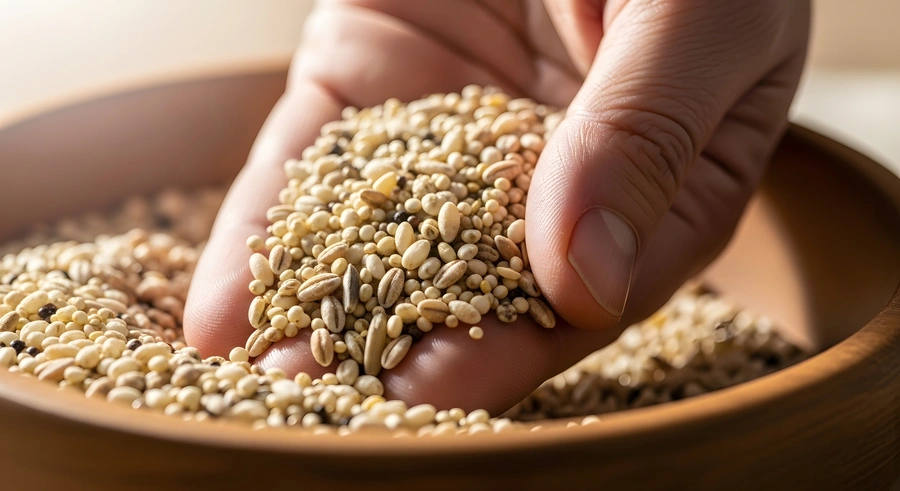Premium Wild Bird Food
Delivered Fresh Nationwide
Sunflower Seeds & Hearts
Loved by Every Garden Bird
High-Quality Peanuts
for Year-Round Feeding
- Family Run Business
- Friendly Customer Support
- Over 40 Years Experience
The Best Wild Bird Food from Around the World
Welcome to S.S. Seed Co., the UK’s first direct-to-customer bird seed mill. For more than 40 years, our family-run business has produced premium wild bird food, pigeon feed, poultry blends and aviary seed at our mill in County Durham. By cutting out wholesalers, we supply fresh, high-quality feed delivered straight from the mill to your door—nationwide.
Shop Bird Food by Category
Featured Products
About SS Seed Co.
S.S. Seed Co is a family-run business with over 40 years of expertise in producing premium pigeon corn, wild bird seed, and small bird seed mixtures. Steve and Anne Swainston operate the company, which sources the finest grains from around the world and blends each batch at its purpose-built mill in County Durham.
With a storage capacity exceeding 1,000 tonnes and the ability to produce 100 tonnes daily, S.S. Seed Co ensures consistent, high-quality nutrition for your birds. As UK pioneers, they offer a direct-to-customer service, cutting out wholesalers and providing delivery across mainland UK.
Trusted by bird enthusiasts nationwide, S.S. Seed Co delivers exceptional feed and value for both pigeons and wild birds.
Tradition meets Innovation
For over 40 years, our family-run business has crafted more than 50 premium pigeon food mixtures, all blended with the finest corn. Operating from our purpose-built grain handling plant in County Durham, we combine heritage with cutting-edge processes to ensure consistency and quality.
As the UK’s first direct-to-customer bird seed mill, we’ve revolutionised accessibility by delivering fresh pigeon feed, wild bird food, and poultry seed directly from the mill to homes nationwide—no wholesalers, no middlemen. Experience the difference with S.S. Seed Co., where quality and convenience redefine pigeon nutrition.
Storage Facility
Our expansive warehouse facility showcases our commitment to excellence, holding over 500 metric tonnes of high-quality bird seed and feed. This ensures a reliable supply of premium wild bird food, pigeon corn, and aviary mixes, ready to meet the diverse needs of bird enthusiasts across the UK.
From experienced pigeon fanciers to families supporting garden wildlife, our stock levels guarantee you’ll always find the right feed. At S.S. Seed Co., we pair quality with abundance, giving your birds the nutrition they deserve.
Bird Feeding Tips, Tricks & FAQs
Welcome to a treasure trove of valuable insights!
You’ll find expert tips to keep your garden birds happy and healthy. Whether it’s safe storage, choosing high-quality seeds, or adjusting feeding routines for the seasons, we’ve got all the answers you need.
What type of bird food should I use
Use straight seeds (e.g., sunflower hearts, peanuts, nyjer) to target specific species, or choose a balanced wild bird seed mix to attract variety. Add suet/fat products in cold weather and mealworms for protein—especially useful in the breeding season.🕊️🌿
When should I feed my garden’s wild birds?
Year-round. In winter, offer high-energy foods to help birds maintain body heat. In spring and summer, prioritise protein (e.g., mealworms) and smaller portions to prevent spoilage. Always provide freshwater.🕊️🌿
Which foods should I avoid?
Avoid salty foods, cooking fats/oils, milk, bread, and anything mouldy or stale. Only offer peanuts unsalted; never give whole peanuts to chicks—use a mesh feeder to prevent choking.🕊️🌿
How do I store bird food to keep it fresh and safe?
What are the most nutritious seeds for wild birds?
Sunflower hearts/black-oil sunflower (energy-dense), nyjer (for finches), peanuts (unsalted), and millet (for ground feeders) are top choices. Quality mixes containing these attract a wide range of species.🕊️🌿
Do birds need different food in summer compared to winter?
How do I prevent pests from accessing bird food in my garden?
How can I feed small birds without attracting larger birds?
Use feeders with small ports, narrow perches or mesh cages. Offer foods preferred by small species (nyjer, sunflower hearts) and position feeders near cover such as dense shrubs to reduce disturbance from larger birds.🕊️🌿













